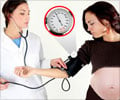University of Louisville Hospital (ULH) has created new hospital guidelines that may help recognize the symptoms of postpartum depression (PDD) which affects new mothers.

"The hospital policies and procedures are designed to provide perinatal nurses the tools they need to prepare new mothers so they are able to self-monitor for symptoms of depression and know what steps to take if they experience symptoms," Logsdon said.
According to Logsdon, most hospitals lack comprehensive perinatal patient PPD assessment, education and referral policies. Although professional organizations such as the Registered Nurses' Association of Ontario previously published a best practices guideline, the recommendations did not focus on the first few days following childbirth or nursing care while the new mother was hospitalized.
"Our recommendations for nursing practice of hospital-based perinatal nurses go beyond previous published guidelines," Logsdon said.
Logsdon and her team, Diane Eckert, BSN, RN, clinical manager, mother-baby unit, ULH, and Roselyn Tomasulo, RN, MSN, perinatal educator, collaborated with internationally-known researchers in the field to draft the article, Identification of Mothers at Risk for Postpartum Depression by Hospital Based Perinatal Nurses. A task force of clinical nurses was consulted to determine how to improve nursing practice at ULH. Implementation included identifying at-risk patients and referral sources; physician and staff education was another component.
"When many nurses enter the profession, they don't fully understand their critical role as patient educators," Tomasulo said. "We are helping our perinatal nurses feel more competent in their roles by offering inter-hospital on-line education and staff training."
Advertisement
The physician, social services worker and oncoming shift nurse are then informed. The nurse who administered the EPDS reviews the results of the depression screening with the patient and her support person. Patients also are informed about depression symptoms and what to do if they begin to feel hopeless.
Advertisement
"We hope our work will be seen as a model of good policy and can be considered by other hospitals and professional organizations," Logsdon said.
Source-Eurekalert















